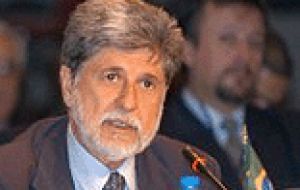MercoPress. South Atlantic News Agency
Security Council calls on Honduras to stop harassing the Brazilian embassy
 Celso Amorim fears the de facto officials could order the storming of the legation
Celso Amorim fears the de facto officials could order the storming of the legation The United Nations Security Council held an emergency meeting on the situation in the Brazilian Embassy in Honduras, where ousted Honduran President Manuel Zelaya has been sheltering since Monday. The council condemned acts of intimidation and called on the de-facto Honduran authorities to stop harassing the embassy.
Security Council president for the month of September, US Ambassador Susan Rice, read a statement from the council, in which it stressed the importance of respecting international law by preserving the inviolability of the embassy and the Vienna Convention on diplomatic relations.
“They [the council] condemned acts of intimidation against the Brazilian Embassy and called upon the de facto government of Honduras to cease harassing the Brazilian embassy, and to provide all necessary utilities and services, including water, electricity, food, and continuity of communications,” she said.
The council also called on all parties to remain calm and to avoid escalating the situation or to place individuals at risk of harm.
Friday's emergency session was requested by Brazil. Foreign Affairs Minister Celso Amorim told the council that the embassy has been under virtual siege by the de facto Honduran authorities.
In addition to cutting utilities and preventing supplies from going into the embassy, he said they have curtailed the movements of Brazilian diplomats.
He expressed concern that the perpetrators of the coup that ousted Mr. Zelaya might try to storm the embassy and arrest him.
“The Brazilian government is gravely concerned that the same people who perpetrated the coup d'etat might threaten the inviolability of the embassy to forcibly arrest President Zelaya,” he said.
“This is not a mere suspicion or speculation; some concrete indications of this possibly have been received.”
Amorim said a bailiff was sent with a search warrant to the Brazilian Embassy, but was not let in. He said the de facto authorities also made reference in a letter to his government about the embassy as a “facility” run by the Brazilians, implying that it does not enjoy diplomatic status.
The Security Council meeting was limited in scope to the situation in the Brazilian embassy in Honduras, not the wider political crisis.
After President Zelaya was forced from office in June in an army-backed coup he came to the UN General Assembly to plead his case. In a non-binding resolution, the General Assembly demanded that he be returned to office, saying he is the legitimate constitutional leader of Honduras.




Top Comments
Disclaimer & comment rulesCommenting for this story is now closed.
If you have a Facebook account, become a fan and comment on our Facebook Page!